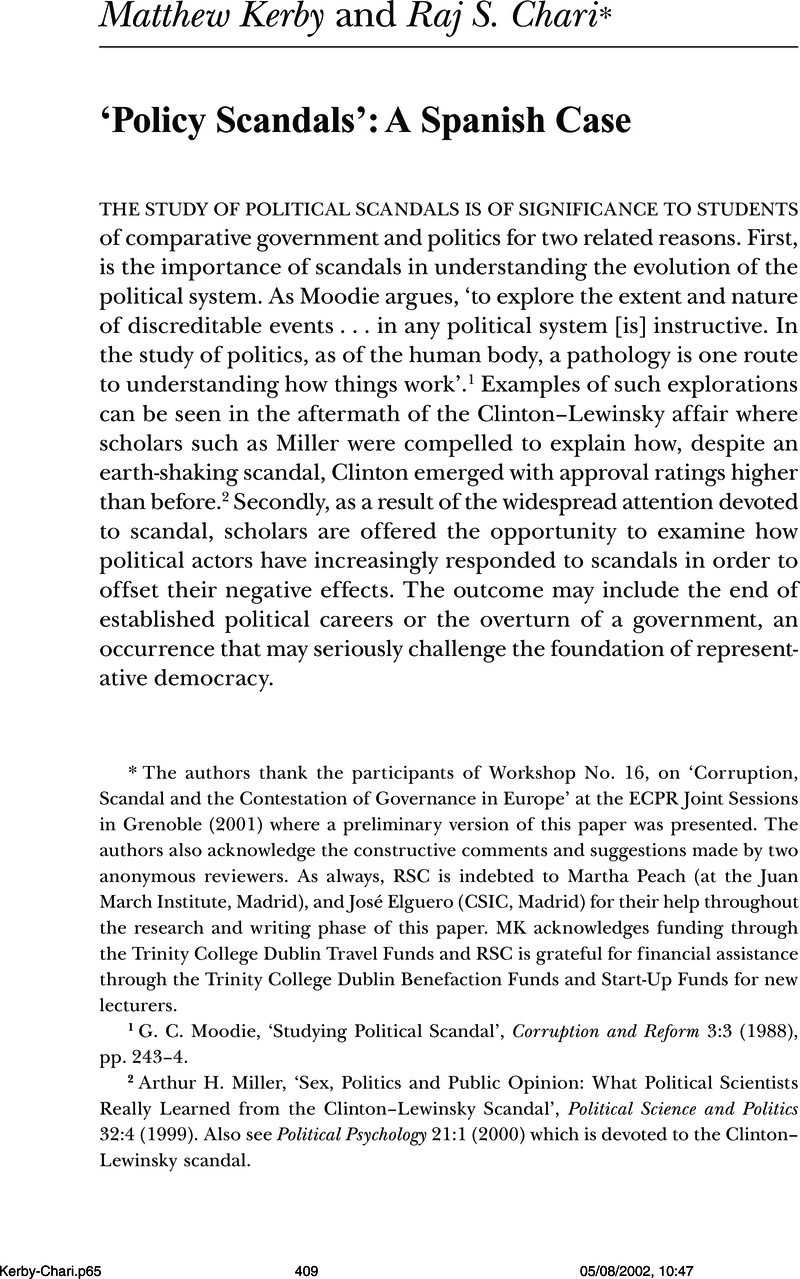Published online by Cambridge University Press: 28 March 2014

* The authors thank the participants of Workshop No. 16, on ‘Corruption, Scandal and the Contestation of Governance in Europe’ at the ECPRJoint Sessions in Grenoble (2001) where a preliminary version of this paper was presented. The authors also acknowledge the constructive comments and suggestions made by two anonymous reviewers. As always, RSC is indebted to Martha Peach (at the Juan March Institute, Madrid), and José Elguero (CSIC, Madrid) for their help throughout the research and writing phase of this paper. MK acknowledges funding through the Trinity College Dublin Travel Funds and RSC is grateful for financial assistance through the Trinity College Dublin Benefaction Funds and Start-Up Funds for new lecturers.
1 Moodie, G. C., ‘Studying Political Scandal’, Corruption and Reform 3:3 (1988), pp. 243–4.Google Scholar
2 Miller, Arthur H., ‘Sex, Politics and Public Opinion: What Political Scientists Really Learned from the Clinton-Lewinsky Scandal’, Political Science and Politics 32:4(1999)CrossRefGoogle Scholar. Also see Political Psychology 21:1 (2000) which is devoted to the Clinton-Lewinsky scandal.
3 Thompson, John. B., Political Scandal: Power and Visibility in the Media Age, Cambridge, Polity Press, 2000.Google Scholar
4 Doig, Alan, ‘The Offence that Dare not Speak its Name: Cash, Corruption and the Hamilton Affair’, Parliamentary Affairs, 51:1 (1998);CrossRefGoogle Scholar as well as Doig, Alan, ‘Sleaze: Picking up the Threads or “Back to Basics” Scandals’, Parliamentary Affairs 54:2 (2001).CrossRefGoogle Scholar
5 Markovits, Andrei S. and Silverstein, Mark, ‘Introduction: Power and Process in Liberal Democracies’, in Markovits, Andrei S. and Silverstein, Mark (eds), The Politics of Scandal: Power and Process in Liberal Democracies, New York, Holmes & M Publishers Inc., 1988.Google Scholar
6 Anthony Barker, ‘The Upturned Stone - Political Scandals in Twenty Democracies and Their Investigation Processes’, Essex Papers in Politics and Government, 1998.
7 J. B. Thompson, Political Scandal, p. 96.
8 Ibid., p. 245.
9 Ibid.
10 Ibid., p. 248.
11 Theresa Capelos and Leonie Huddy, ‘Scandal Immunity as a Function of Candidate Gender and Personality Traits’, Paper presented at the Annual Meeting of the American Political Science Association, Atlanta, Georgia, 2–5 September, 1999.
12 Barker, Anthony, ‘Political Responsibility for UK Prison Security — Ministers Escape Again’, Public Administration, 76:1 (1998).CrossRefGoogle Scholar
13 El Pais, 13 May 1999.
14 El Pais, 29 May 1999.
15 El Pais, 19 and 21 May 1999.
16 Cambio 16, 14 June 1999.
17 El Pais, 20 May 1999.
18 El Pais, 12 June 1999.
19 El Pais, 2 June 1999.
20 Jimenez, Fernando, ‘Political Scandals and Political Responsibility in Democratic Spain’, West European Politics, 21:4 (1998), pp. 80–102. CrossRefGoogle Scholar
21 El Pais, 6 June 1999.
22 El Pais, 7 July 1999.
23 El Pais, 29 July 1999.
24 Chari, Raj S., ‘The March 2000 Spanish Election: “A Critical Election”?’, West European Politics, 23:3 (2000)CrossRefGoogle Scholar.
25 Cambio 16, 1 January 2001.
26 Cambio 16, 1 January 1999.
27 El Pais, 20 March 2001.
28 El Pais, 23 July 1999.
29 El Pais, 21 July 1999.
30 Financial Times, 31 August 1999.
31 The Economist, 27 July 2000.